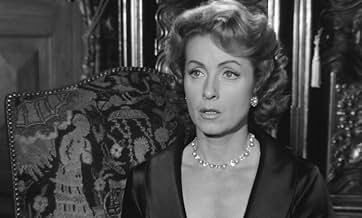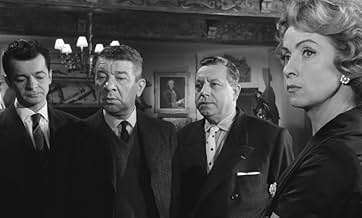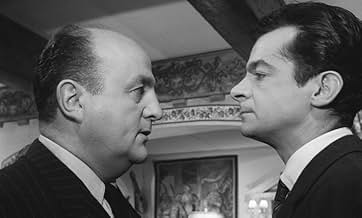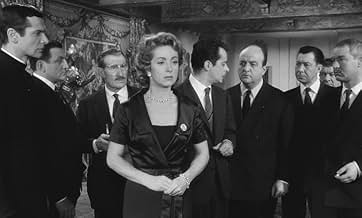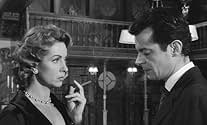CALIFICACIÓN DE IMDb
7.5/10
1.5 k
TU CALIFICACIÓN
Agrega una trama en tu idiomaFifteen years after WWII, a group of ex-resistance fighters are brought together by Marie-Octobre, so that the former members of the network can finally relive one fateful night and find out... Leer todoFifteen years after WWII, a group of ex-resistance fighters are brought together by Marie-Octobre, so that the former members of the network can finally relive one fateful night and find out who betrayed their murdered leader, Castille.Fifteen years after WWII, a group of ex-resistance fighters are brought together by Marie-Octobre, so that the former members of the network can finally relive one fateful night and find out who betrayed their murdered leader, Castille.
- Dirección
- Guionistas
- Elenco
René Brejot
- Self - Wrestling Referee
- (sin créditos)
Roger Delaporte
- Self - Wrestling Match on TV
- (sin créditos)
Iska Khan
- Self - Wrestling Match on TV
- (sin créditos)
King Kong Taverne
- Self - Wrestling Match on TV
- (sin créditos)
Paul Villard
- Self - Wrestling Match on TV
- (sin créditos)
Opiniones destacadas
Resistance fighter Marie-Octobre (it's her former code name) gathers her mates after the war.There's a traitor among them and they've got to discover him and do away with him.The audience is induced to suspect one by one all the "guests",à la Agatha Christie.The film forgets the historical background very quick to focus on an efficient but rather artificial suspense.
The good cast (Danielle Darrieux,Serge reggiani,Bernard Blier,Paul Meurisse) makes up for the conventional side of this story.It' s a watchable work,but it's not representative of Julien Duvivier's greatness:he was in the last part of his brilliant career and time had begun to take its toll.But his touch is still here though.
The good cast (Danielle Darrieux,Serge reggiani,Bernard Blier,Paul Meurisse) makes up for the conventional side of this story.It' s a watchable work,but it's not representative of Julien Duvivier's greatness:he was in the last part of his brilliant career and time had begun to take its toll.But his touch is still here though.
Based on a novel by Jacques Robert, Julien Duvivier, Henri Jeanson and the author himself, wrote an original script for this film, which actually looks more like a play, as everything happens in the space of a few hours, and almost always in the same room.
The plot, despite focusing on the discovery of a traitor, among the group of old comrades in arms, of the resistance, almost seems like a long scene from Agatha Christie, in which Hercule Poirot unfolds hypothesis after hypothesis, until concluding with the discovery of the murderer.
The main attraction of the film is that it allows us to read between the lines of the police plot, to show a France that is both resistant and collaborative. They are all suspects because, despite being heroes of the resistance, they all collaborated, more or less, with the German invader and the Vichy government. And everyone accuses each other of these civic sins.
It is France settling accounts with history and clearing its guilty conscience of defeat and collaborationism, during the Nazi occupation.
In this sense, it is a provocative work, for its time. But subtly reading.
However, in general, it looks almost like a banal Cluedo game, despite a cast full of stars.
The plot, despite focusing on the discovery of a traitor, among the group of old comrades in arms, of the resistance, almost seems like a long scene from Agatha Christie, in which Hercule Poirot unfolds hypothesis after hypothesis, until concluding with the discovery of the murderer.
The main attraction of the film is that it allows us to read between the lines of the police plot, to show a France that is both resistant and collaborative. They are all suspects because, despite being heroes of the resistance, they all collaborated, more or less, with the German invader and the Vichy government. And everyone accuses each other of these civic sins.
It is France settling accounts with history and clearing its guilty conscience of defeat and collaborationism, during the Nazi occupation.
In this sense, it is a provocative work, for its time. But subtly reading.
However, in general, it looks almost like a banal Cluedo game, despite a cast full of stars.
This movie is casted with the best french actors of the time ; everyone of them made a sparkling career : Danièle Darrieux, Paul Meurisse, Lino Ventura, Bernard Blier, Paul Le Guers, Sege Reggiani, both in movies and theater. Many are second roles performers who illustrated themselves in mystery movies. The dialogues are witty; may be you have to know french to appreciate it to the most. The violence is in the heavy atmosphere unlike actual movies,although some scenes are physical.The plot is intelligent like an Agatha Christie and well organized by the Director. Jean Duvivier is one of the best of his generation. I would recommend it to any movie lovers.
This movie is more like a theater-play: very much talking and hardly any action. All talking is done in French, and deals with a very haunting issue: in 1959 a former French resistance group reunites to search themselves for a traitor who killed one of them back in 1944. In this way a real Agatha Christie-like plot develops, all set in the long dark shadows of World War II and its horrors. Leading female star Danielle Darrieux gives a glittering performance, both in her talking and in her presence. The male cast around her consists of some of the greatest French actors at the time. 'Marie-Octobre' is not an easy movie to watch: you have to concentrate on it. If you do so, you'll be swept along onto its climax and surprising end.
Duvivier seems capable like no other of really laying out the most unpalatable truths. The movie shows a group of resistance fighters assemble for a reunion 15 years after the war is over. It's genre is whodunnit (who betrayed our leader in this case), but it's a lot more impressive than that suggests. What the structure does do is allow for a lot of suspense, the movie really kept me fascinated.
Right from the start nothing appears particularly heroic about the group, their meet up is as awkward as an SS reunion. After the war they all went their separate ways pretty much (with exceptions, such as Marie-Octobre and Francois, the rich industrialist who funds her fashion house). Why is this important. It feels like they maybe did dirty things together, took justice into their own hands, skulked around in the shadows. Maybe their cause justifies everything, I guess that would be the traditional view anyway. I'm in my mid thirties and I never met anyone who believed in a cause, people choose activities and roles that suit them, that is all, killing as an activity is much more fundamental than the cause it underlies.
There is something extremely unhealthy about the male "comrades" and their attitude to Marie-Octobre. At the beginning Francois introduces her as "notre fleur de fusil", or the rose in our guns. Her role generally seems to be "unattainable sex object". She refers to the gathering at one point as a "huis clos", a term for a closed proceedings, but surely meant to evoke Sartre's play ("No Exit" in English), about the pain of being aware of yourself an an object to others' perception, set in Hell. I refer to them as comrades in inverted commas because they are all quite ready to suspect one another at the drop of a hat. In a particularly galling act of cowardice they all write down the name of the person they prejudge as being guilty and anonymously drop their ballots into an urn.
No new truths are discovered in the course of the meeting, these are all people who know one another, all they have to do is work out, in a rather anally retentive fashion how each individual's proclivities could have lead to the death of their leader.
I personally found the elegant and aristocratic Francois almost intolerably overbearing and sanctimonious. His view of order must be imposed on everyone else. I never felt more in favour of anarchy than when watching this movie.
Right from the start nothing appears particularly heroic about the group, their meet up is as awkward as an SS reunion. After the war they all went their separate ways pretty much (with exceptions, such as Marie-Octobre and Francois, the rich industrialist who funds her fashion house). Why is this important. It feels like they maybe did dirty things together, took justice into their own hands, skulked around in the shadows. Maybe their cause justifies everything, I guess that would be the traditional view anyway. I'm in my mid thirties and I never met anyone who believed in a cause, people choose activities and roles that suit them, that is all, killing as an activity is much more fundamental than the cause it underlies.
There is something extremely unhealthy about the male "comrades" and their attitude to Marie-Octobre. At the beginning Francois introduces her as "notre fleur de fusil", or the rose in our guns. Her role generally seems to be "unattainable sex object". She refers to the gathering at one point as a "huis clos", a term for a closed proceedings, but surely meant to evoke Sartre's play ("No Exit" in English), about the pain of being aware of yourself an an object to others' perception, set in Hell. I refer to them as comrades in inverted commas because they are all quite ready to suspect one another at the drop of a hat. In a particularly galling act of cowardice they all write down the name of the person they prejudge as being guilty and anonymously drop their ballots into an urn.
No new truths are discovered in the course of the meeting, these are all people who know one another, all they have to do is work out, in a rather anally retentive fashion how each individual's proclivities could have lead to the death of their leader.
I personally found the elegant and aristocratic Francois almost intolerably overbearing and sanctimonious. His view of order must be imposed on everyone else. I never felt more in favour of anarchy than when watching this movie.
¿Sabías que…?
- TriviaFrench visa # 21312.
- ConexionesFeatured in Danielle Darrieux: Il est poli d'être gai! (2019)
Selecciones populares
Inicia sesión para calificar y agrega a la lista de videos para obtener recomendaciones personalizadas
- How long is Marie-Octobre?Con tecnología de Alexa
Detalles
- Tiempo de ejecución1 hora 30 minutos
- Color
- Relación de aspecto
- 1.66 : 1
Contribuir a esta página
Sugiere una edición o agrega el contenido que falta


![Ver Bande-annonce [OV]](https://m.media-amazon.com/images/M/MV5BZmM2Y2Q3NmEtM2E2Yi00MWY5LTlmZjEtMDUzYjc3MDQ0YzRiXkEyXkFqcGdeQXRyYW5zY29kZS13b3JrZmxvdw@@._V1_QL75_UX500_CR0)
